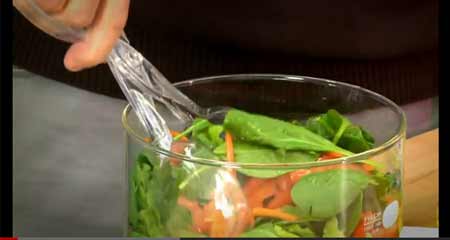According to scientists from the Purdue University, opting for the right kind of salad dressing is important to gain healthy nutrients from vegetables in the salad. Apart from the type, the amount of dressing used in the preparation also counts, they say.
As part of the study, a set of individuals was fed salads accentuated with polyunsaturated, monounsaturated and saturated fat dressings. Subsequently, blood tests were conducted to gauge how much carotenoids the participants absorbed. This nutrient is apparently correlated with low risk for conditions like macular degeneration, cancer and heart disease.
“If you want to utilize more from your fruits and vegetables, you have to pair them correctly with fat-based dressings. If you have a salad with a fat-free dressing, there is a reduction in calories, but you lose some of the benefits of the vegetables,” remarked Mario Ferruzzi, the study’s lead author and a Purdue associate professor of food science.
The results showed that monosaturated fat seemingly used the least proportion of fats to generate carotenoids. On the other hand, polyunsaturated and saturated fats apparently required more fat to offer benefits. Most of us believe that cutting down on fat may be advantageous in terms of weight loss.
However, the findings reported in the journal, Molecular Nutrition & Food Research showed that topping off salads with the right kind and amount of fat-based salad dressings is important. Those very keen on opting for low-fat alternatives can use monosaturated constituents such as canola or olive oil dressings to make the most benefit from the vegetables in the salad.
Though a low fat dressing could reduce the number of calories, it may not aid in absorbing all the nutrients of vegetables and fruits in the salad.

